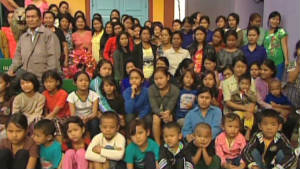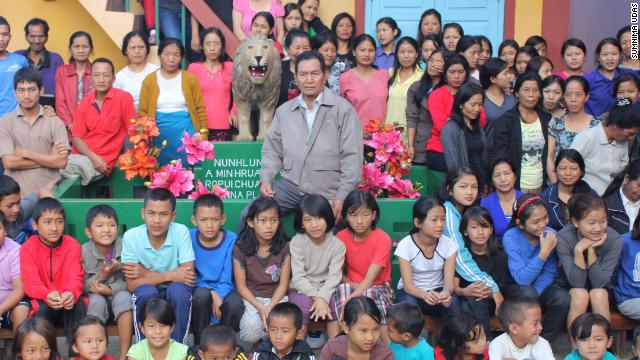Is 160 enough?
October 31, 2011 -- Updated 1802 GMT (0202 HKT)
Ziona, center, with his has 39 wives, 86 children and 35 grandchildren in rural Baktwang village, India.
STORY HIGHLIGHTS
- One man in India is the patriarch of a family of 160 in rural India
- Ziona, who only goes by his first name, has 39 wives, 86 children and 35 grandchildren.
- Ziona's father, Chana, founded the Christian sect in Baktwang that promotes polygamy
- "I never wanted to get married but that's the path God has chosen for me"
Mizoram, India (CNN) -- The world's population hits 7 billion this week, but Ziona, the patriarch of what may be the biggest family in the world, is not bothered.
"I don't care about overpopulation in India ... I believe God has chosen us to be like this (have big families). Those who are born into this family don't want to leave this tradition so we just keep growing and growing," he says with a smile.
Ziona, who only goes by his first name, has 39 wives, 86 children and 35 grandchildren.
Ziona's father, Chana, founded the Christian sect in Baktwang village that promotes polygamy as God's will. "I never wanted to get married but that's the path God has chosen for me," he says. "It's not my wish to keep marrying again and again."
All 160 family members live in a four-storey mansion perched on top of a remote village in the northeastern Indian state of Mizoram.
The state, neighboring Myanmar and Bangladesh, has one million residents, one of the lowest population densities in this country of 1.2 billion. Despite its natural beauty, special permits are required to enter the state, making tourism virtually non-existent.

Four hours away from Mizoram's only airport, in the isolated village of Baktwang, Ziona's bright purple house with 22 bedrooms stands out.
The main room is a giant hall where the family cooks, eats and prays. The bedrooms are dormitory-style with an average of 20 beds, each double bed about a foot apart from the next. The children sleep with their mothers who take turns visiting the 69 year-old's master bedroom.
"There is no discrimination amongst us, he treats us all equally," fifth wife Twangi says.
Ziona first got married when he was 17 to Zathiangi, who is now 70. His youngest wife is 31.
As the eldest wife, Zathiangi calls all the shots in the kitchen so meal times are an efficient exercise.
Without much fuss, while some women of the house cook, others set the table, still others serve and clean.
"We cook 25 kilograms of rice, 40 kilograms of potatoes and 5 kilograms of lentils everyday," Twangi says.
The family indulges in meat three times a week and for every non-vegetarian meal, 30 chickens are plucked and a giant pig is roasted.
But the sheer volume of food that needs to be cooked or plates that need to be washed doesn't overwhelm the women of the house.
Like a well-oiled machine, everyone carries out their individual chore, so dinner for 160 is ready within an hour and utensils are washed and put away within minutes.
Even the children help out. Tiny 6-year-olds have become experts at plucking chickens, and everyone seems to get along.
"No fighting, never, we are all one family, there's no other people here so we don't fight," says sixth grandson Hmingthamzauva, one of the few in the household who speaks English.
"Since we are used to living in a very big family when we go outside to study we actually feel very lonely," he says laughing.
I'm not troubled by the noise or the overcrowding. My mind remains at peaceZiona, patriarch of family of 160
But while he likes living in a big family, he himself doesn't want more than one wife.
"My grandfather is specially appointed by God to have as many wives as possible and to look after them. But for me, having one wife and one son is quite enough. There is no rule or tradition as such that we have to follow polygamy, for me it's actually unbearable," Hmingtahmzauva says.
Hmingtahmzauva says his great grandfather Chana, who also had multiple wives, had a spiritual revelation after he was expelled from the Catholic Church for his unusual lifestyle.
So Chana created his own polygamist sect, which now has a following of 400 families.
Ziona is the caretaker of the self-reliant sect. They grow their own crops and raise their own livestock.
"Everyone has a designated job. Some are doing carpentry work, some take care of the piggery and poultry farm and others cultivate crops," Ziona says.
He has set up a school nearby for children of the community, the curriculum comes from the government but Ziona has added some sect-specific teachings.
"My father is the greatest god that we can have in this world, he has done so much for us," says his eldest son Nunparliana, who has two wives and 14 children.
India is set to overtake China as the world's most populous nation by 2030. But crowding and crumbling infrastructure in India's booming cities don't faze Ziona.
"I'm not troubled by the noise or the overcrowding. My mind remains at peace," he says.
The family is not listed in the Guinness Book of World Records because Ziona says he doesn't want the publicity. But as word gets out, Baktwang village and Ziona's family may not remain so isolated.
=======================================

No comments:
Post a Comment